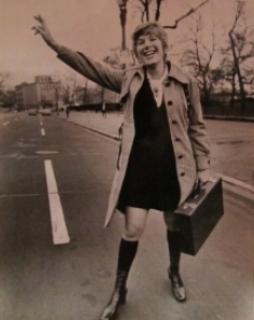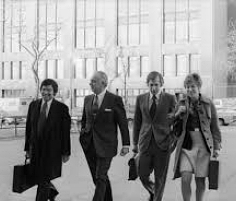A Tale of Watergate: Straight From the Source and Still Spellbinding
/The Watergate Girl, My Fight for Truth and Justice Against a Criminal President
by Jill Wine-Banks
THE book to read as we shelter in place
My regular series of Literary Salons had been put on hold during my own book launch and I wanted to restart it with a flourish this spring. My “get” was MSNBC legal analyst and former Watergate prosecutor Jill Wine-Banks introducing her new book. We held the salon on March 12, virtually on the cusp of having to sequester ourselves in the face of the coronavirus. The series is back on hold, just like the rest of life right now, but we went out with a big blockbuster of a bang, and I highly recommend the book.
I first wrote about Jill in this blog back in the summer of 2017 as part of a Re-Radicalized series, focusing on individuals newly recharged as activists. She’d just made her debut on MSNBC on the strength of an explosive op-ed comparing the current political environment to that of Watergate, “Comey’s Firing Is as Bad as the Saturday Night Massacre.” It turned out that this move was just the latest step in an amazing career, one that began with Richard Nixon and, as she put it, was “re-invented by Trump.”
At the time she’d also been working on a memoir about her role as the only woman prosecutor on the Watergate team, a story that would offer a different lens on the familiar tale, as well as how she was able to soar in a once-in-a-lifetime career spotlight, despite being routinely undermined as a “woman lawyer.” At the time, Jill had been worried that Watergate would no longer be of sufficient interest or relevance to support her book. Instead, events surrounding the current presidential administration have actually launched her back onto the national stage under a light as bright as it was in the Watergate courtroom. She’s become our interpreter for how history has been repeating itself, down to the astounding details.
The timing for her book launch is now perfect. And, with the virus shut down, we can all use a spellbinding diversion.
At the salon, I had the honor of leading an “in conversation” interview with Jill. It was a thrill to listen as she gave us the skinny on behind-the-scenes intrigue and insights about what we may have thought we knew. Salon participants also peppered her with additional questions we’d always wanted to ask. Here are a few tidbits to whet your appetite for this amazing book.
The “Lady Lawyer”
the mini-skirted prosecutor
The challenge of taking on an entire presidential administration was formidable enough, yet as the only woman on the team, Jill also had to contend with 1973 attitudes, where she was regularly singled out and undermined. The daily scrutiny of her apparel and hairstyles led to some relatively benign monikers including “the mini-skirted prosecutor” and “the leggiest Watergate lawyer,” though she took umbrage at being called a “lady lawyer.” There’s no such thing, she said. “I was a lawyer, period.”
The condescension of the times also more seriously impacted her role as a trial lawyer in the case. Watergate Judge John Sirica would regularly interrupt with comments he thought would be useful, like telling a combative witness, “Now, you never gain arguing with a woman,” and stopping an interrogation of a female witness with “we can’t have two ladies getting into an argument in the courtroom.”
“I couldn’t say anything in those days. I had to just stand and take it,” Jill said. Imagine what she would do today.
A Legal Version of All the President’s Men
During the interview, I admitted I had been a Watergate junkie, and had initially approached her book assuming it would be interesting, but not new. After all, we all know the story, right? I was so wrong. The page-turning book is both fascinating and revelatory. I offered up my layperson’s interpretation, comparing it to All the President’s Men. That book was the story of the journalists who found out what happened; The Watergate Girl is the story of the legal team who had to figure out how to prove it. Both stories are equally absorbing: Woodward and Bernstein may have had Deep Throat, but Jill had Nixon’s secret tapes. A few highlights:
The team was very young. Instead of staffing up with seasoned specialists with decades of credentials, as you might expect, Special Prosecutor Archibald Cox “was looking for smart, talented lawyers with good judgment, who were young and vigorous enough to endure crushingly long days and high-stakes pressure.” Though Jill had a track record as a tough and winning trial lawyer at the Department of Justice, she was only still barely thirty. . . a kid.
Jill may have been the only female on the legal team, but contrary to what some had thought she was not brought on strictly to interrogate Rose Mary Woods, Nixon’s secretary, woman to woman. She was brought onto the team early, and assigned to Woods only as part of the regular witness rotation order.
The team developed a road map for how to proceed with the investigation, but the trajectory was continuously changed by a series of “surprises,” some welcome and some not. One of the worst was the Saturday Night Massacre, when Nixon wanted Cox, Jill’s boss, removed. Both Attorney General Elliot Richardson and Deputy AG William Ruckelshaus refused and were fired on the spot. But Cox was ultimately out after Bork assumed the task. After that, the team knew Nixon could shut them down any second. They kept working furiously, sometimes squirreling away evidence so it wouldn’t be found, other times not knowing from day to day if they were even still officially employed.
The best surprise was the discovery of the tapes. No one knew that Nixon had regularly, and secretly, taped Oval Office conversations, but John Dean had suspicions. Only when reluctant witness Alexander Butterfield, Haldeman’s assistant, felt compelled to answer a direct question and testified this was true, was this evidence revealed. The case broke wide open.
The team had also been able to subpoena the calendars of the various White House officials involved in the suspected cover-up, including Nixon. By checking the calendars against witness testimony and the tapes, they were able to find out the truth. Haldeman, for example, had testified that Nixon had said “it would be wrong” to pay off the Watergate burglars for their silence, but the tape of the meeting showed that was a lie. Nixon supported the crime. Game on.
Without the tapes, Jill said, they would never have been able to convict Nixon.
The Perry Mason Moment
Arguably, the most famous moment of the entire impeachment trial was the dramatic exposure of the lie that proved that the missing eighteen-and-a-half minutes of tape were intentionally erased.
The story was that when Nixon’s long-time devoted secretary, Rose Mary Woods, was transcribing the tapes, a telephone call caused her to perform a complicated combination of manoeuvers on a recording machine that included keeping her foot on a pedal while leaning back to answer the phone. This caused an accidental gap.
Woods Demonstrating the “Rose Mary” Stretch
Jill was suspicious about how that could physically happen, pressing a combative Woods during questioning to the point where she nearly incriminated the president right on the stand, but not quite. Jill was convinced Woods had been thrown under the bus by Nixon to cover up his own role in erasing the tapes. But how to prove it?
In a brave and audacious move, Jill suggested they adjourn to Woods’s White House office, where Woods could demonstrate the actions she claimed had happened.
By performing what came to be called “The Rose Mary Stretch,” her foot came off the pedal, a moment memorialized in the famous photo. The lie was proved as Woods was caught in the act. As Jill put it, “it was the powerfully dramatic moment that is commonplace in trials on TV, but almost never happens in real courtrooms.”
It was the beginning of the end for Nixon.
The Hamster Wheel of History
As anyone who follows Jill on MSNBC knows, she has been very effective in pointing out the parallels between Richard Nixon and Donald Trump over the past three years, in an effort to help us better understand what is going on today and what can and should be done about it. She’s often discussed their similar personalities and ultimate impeachments. Our conversation dug in on the details.
Each president referred to their impeachment as “a witch hunt” and “a hoax.”
Both presidents had a similarly expansive view of executive privilege. They both refused to honor subpoenas. They both stalled on vital documents. Nixon refused to produce the tapes; Trump to allow either documents or witnesses.
Nixon was forced to comply when the court ordered that “executive privilege did not exempt the president from honoring a subpoena. He had to obey the law like everyone else.”
Despite that precedent, Trump was able to obstruct. Why? According to Jill, here’s where the parallel breaks down.
Nixon, as complicated as he was, still believed in the rule of law.
In 1973, the three branches of government operated more clearly as separate and independent checks and balances on the Executive Branch than they do today.
It was his own party that confronted Nixon and told him he had to resign. As one of the senators said during that fateful meeting in the White House, “There is a certain amount of immorality that almost all politicians will tolerate, but there is a threshold.” Nixon crossed it and his party turned against him. Today’s Republican-controlled Senate is a very different animal.
This was one of our best literary salons to date with a great speaker introducing a great book. I hope this recap will inspire you to get the book and relive or hear the story for the first time. You can purchase The Watergate Girl in all formats (paperback, eBook, and audiobook) through regular channels. However, in this shelter-in-place time, we ask you to consider supporting independent bookstores who are struggling. Volumes Books, who has been with Jill’s book tour, ships nationally. Also, BookShop supports all independent bookstores nationwide. Check out more about Jill at her website.












